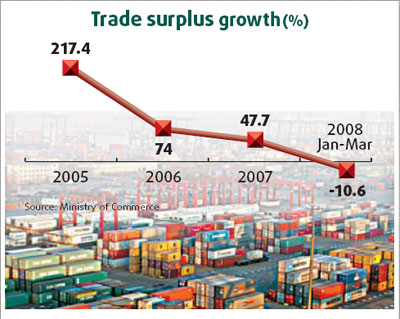China's largest trade exhibition opened in the capital of Guangdong province today, at a time when China's export prospects for this year are unclear in light of the US recession and the yuan's appreciation.
The 103rd China Import and Export Fair, also known as Canton Fair, would run until the end of the month for 500,000 exhibitors and buyers, fair spokesman Xu Bing said.
Many traders and government officials regard the event as a compass. It is widely believed the transactions of the next two weeks would be indicative of China's trade for the next year.

"The Canton Fair is the barometer of China's trade," Xu said at a press conference yesterday. "We expect to see the trends of the overall trade situation emerge through the event."
According to Customs figures released last week, the growth rate of China's exports in the first quarter of the year declined for the first time in three years. Many experts caution that China's exports could decline this year, as the yuan continues to appreciate and the US market shrinks, bogged down by the subprime crisis.
It has also been reported that many factories in the Pearl River Delta have closed under the pressure of rising costs and the yuan's appreciation. The most heavily impacted companies were from the textile, garment, shoes and toy-making sectors.
However, the number of traders attending the fair would equal that of last year, Xu said.
Organizers invited 36,600 buyers to this year's event - 4,600 more than for last October's.
Domestic enterprises were predominant among the 19,000-odd exhibitors, about 500 of which are foreign. Most overseas exhibitors are from Malaysia and the United States.
Canton Fair is a biannual event held in spring and autumn since 1957. China introduced imports to the fair last year, as the country aims to increase the volume of products it buys while lowering its trade surplus.
Xu said the fair this year would emphasize quality and environmental protection. Enterprises with poor records on environmental protection and product quality would be banned from exhibiting. He added this year's fair would also make greater efforts to boost intellectual property rights (IPR) protection, and exhibitors found infringing upon IPR would be banned from all future fairs.
(China Daily April 15, 2008)